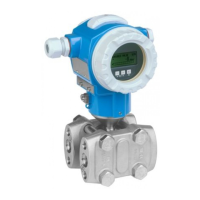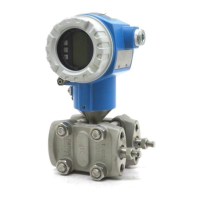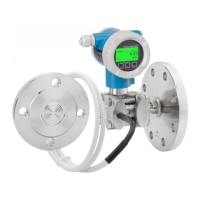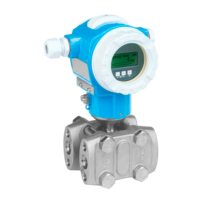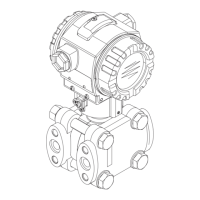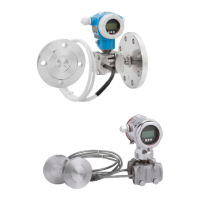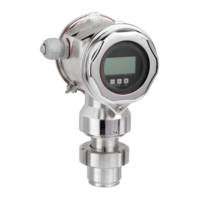Do you have a question about the Endress+Hauser Deltabar PMD75B and is the answer not in the manual?
Provides information required throughout the device lifecycle, from identification to disposal.
Explains safety, electrical, and information symbols for clear communication.
Defines abbreviations and guides on obtaining device documentation.
Lists registered trademarks mentioned in the document.
Outlines qualifications and authorizations for installation, commissioning, and maintenance personnel.
Defines device purpose and safety guidelines for working on and with the device.
Covers safe operation, modifications, and repair guidelines for device reliability.
Confirms product safety standards and outlines IT security responsibilities.
Describes the physical design of the device, including the measuring cell and flow measurement.
Details the measuring cell's construction and how it measures differential pressure.
Explains flow measurement principles using the Deltabar with orifice plates or Pitot tubes.
Provides a checklist for verifying the device upon delivery and checking for damage.
Describes methods for identifying the device, such as nameplate, order code, and serial number.
Provides guidelines for proper storage and transport of the device to prevent damage.
Outlines general instructions and requirements before mounting the device.
Details mounting for flow, level, pressure, and differential pressure measurements, including wall/pipe mounting.
Outlines precautions for oxygen applications and details seal compatibility.
Lists checks to perform after mounting the device to ensure proper installation.
Covers potential equalization and requirements for optimal electromagnetic compatibility.
Guides connecting the device, covering supply voltage, wiring, terminals, and cable entries.
Provides specifications for protective ground, cable shield, and PROFINET cables.
Details IP ratings for cable entries and housing, warning about incorrect mounting.
Lists various methods for operating and configuring the device.
Explains the function of operating keys and DIP switches on the electronic insert.
Details the functions and display elements of the optional local display.
Explains how to access the device's operating menu using a web browser and its prerequisites.
Provides an overview of device description files and current device version data.
Explains the purpose of the Device Master File (GSD) for integrating devices into bus systems.
Shows available modules for cyclic data exchange with an automation system.
Explains S2 system redundancy for continuous operation with two automation systems.
Covers preliminaries for commissioning, including measuring range and pressure warnings.
Explains how to establish a connection via FieldCare/DeviceCare using PROFINET protocol.
Covers hardware settings, including device name and default IP address configuration.
Details device configuration for differential pressure, level, and pressure measurements.
Guides on how to read the device's write protection status from different interfaces.
Explains how to read measured values from the web server and the 'Measured values' submenu.
Describes methods for adapting the device to process conditions using basic and advanced settings.
Details the process of sensor calibration to correct deviations and drifts in pressure sensors.
Provides general troubleshooting steps for common errors like device not responding or no values on display.
Explains the meaning of diagnostic information indicated by the device's LEDs.
Describes diagnostic messages and status symbols displayed on the local display.
Explains how diagnostic faults are displayed in the web browser header and diagnostics menu.
Provides a chronological overview of event messages, including diagnostic and information events.
Explains how to use filters to display specific categories of event messages in the logbook.
Lists information events with their numbers and names, indicating device status changes.
Explains how to reset the device, including password reset and device configuration reset.
Describes maintenance tasks related to physical device components.
Explains the use of flushing rings for cleaning the membrane without removing the device.
Provides notes on exterior cleaning, emphasizing agent compatibility and avoiding mechanical damage.
Covers the general repair concept, modular design, and contact information for service.
Warns about incorrect repair of Ex-certified devices and outlines required safety measures.
Explains how to identify and order spare parts using nameplates and the Device Viewer.
Provides instructions and conditions for returning devices for calibration or due to incorrect orders.
Lists accessories specific to the device, including mechanical parts and plug connectors.
Details mechanical accessories like mounting brackets, manifolds, and adapters.
Lists available plug connectors with specifications like degree of protection and cable length.
Mentions the Device Viewer for listing and ordering spare parts.
Provides output signal specifications for PROFINET with Ethernet-APL, including damping and linearization.
Specifies ambient temperature ranges and conditions, including hazardous area considerations.
Details process temperature and pressure ranges, and seal compatibility for various conditions.
| Brand | Endress+Hauser |
|---|---|
| Model | Deltabar PMD75B |
| Category | Measuring Instruments |
| Language | English |
